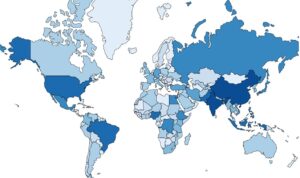Top 10 most expensive cities in 2024

Certain cities have a higher price tag because of their luxurious lifestyles and tall structures. This article examines the top 10 most costly cities in 2024, going in-depth on the reasons for their astronomical prices as well as the realities of living in such high-stakes settings. Get ready to find out which cities are the most expensive locations to live.
The top 10 most expensive cities for expatriates in 2024 are:
- Hong Kong
- Singapore
- Zurich, Switzerland
- Geneva, Switzerland
- Basel, Switzerland
- Bern, Switzerland
- New York, United States
- London, United Kingdom
- Nassau, Bahamas
- Los Angeles, United States.

In 2024, according to Mercer’s Cost of Living Survey, Hong Kong has been ranked as the most expensive city in the world for expatriates. This marks the fifth time Hong Kong has claimed the top spot. The high cost of living in Hong Kong is primarily driven by expensive housing markets, high transportation costs, and elevated prices for goods and services.

Following Hong Kong, Singapore is the second most expensive city. The city-state’s strategic location, political stability, and business-friendly environment have made it a popular destination for global talent, which has driven up living costs, particularly in housing.
Swiss cities dominate the rest of the top ten, with Zurich, Geneva, Basel, and Bern taking the third, fourth, fifth, and sixth places, respectively. These cities are known for their high standards of living and strong economies, which contribute to their elevated costs of living.

New York City is ranked as the seventh most expensive city for expatriates, according to Mercer’s Cost of Living Survey. The high cost of living in New York is driven by expensive housing, transportation, and general living expenses. The average rent for a one-bedroom apartment is approximately $3,786 per month, significantly higher than the national average of $1,517. Additionally, the median home price in the city is around $764,000, which is also above the national average of $505,700.
London follows closely behind, ranking eighth in the same survey. The city experienced a notable increase in its ranking, moving up from 17th place the previous year. The cost of living in London is similarly influenced by high housing costs and transportation expenses.
Nassau, Bahamas, is positioned ninth, while Los Angeles rounds out the top ten. Los Angeles has also been impacted by rising housing costs and other living expenses, making it one of the more expensive cities in the United States.
Overall, the rankings reflect a trend of increasing living costs in major urban centres, driven by various economic factors, including inflation and housing market fluctuations
What factors contribute to Hong Kong being the most expensive city in 2024?
As to why Hong Kong is currently the most expensive city in 2024, there are several factors contributing to this. Some of these include:
1. Housing Market
The primary driver of Hong Kong’s high cost of living is its expensive housing market. The city has a scarcity of living spaces, which leads to skyrocketing rents and property prices. Expats often find themselves allocating a significant portion of their income towards housing, which severely impacts their overall disposable income.
2. Transportation Costs
Transportation expenses in Hong Kong are also considerable. The costs associated with public transport and commuting contribute to the overall high living expenses, making it a financial burden for residents.
3. High Prices for Goods and Services
The cost of everyday items, including food, clothing, and household goods, is notably high in Hong Kong. This is exacerbated by inflation and exchange-rate fluctuations, which directly affect the purchasing power of expatriates.
4. Inflation
Inflation has been a persistent issue, influencing the prices of various goods and services. The rising costs of essential items further strain the budgets of residents, particularly those who are new to the city and may not have established financial stability.
5. Economic Factors
Hong Kong’s status as a major financial hub attracts a large influx of international workers, which increases demand for housing and services. This economic activity, while beneficial for the city’s economy, also contributes to the rising cost of living as more people compete for limited resources.
These factors combined make Hong Kong not only the most expensive city for expatriates but also a challenging environment for many to navigate financially.
How do Singapore and Zurich compare to Hong Kong in terms of living costs?
In comparing the living costs of Hong Kong, Singapore, and Zurich, several key factors emerge:
Hong Kong vs. Singapore
- Overall Cost: Hong Kong is approximately 13% to 17% less expensive than Singapore, depending on the source. For instance, one report states that living in Singapore is 16.5% more expensive than in Hong Kong.
- Housing: Rent in Singapore is notably higher. A one-bedroom apartment in downtown Singapore costs about $2,587, compared to $2,033 in Hong Kong. Family housing costs also reflect this trend, with a three-bedroom apartment costing $4,669 in Singapore versus $4,405 in Hong Kong.
- Food and Dining: Eating out is generally more expensive in Singapore. For example, a basic meal in an inexpensive restaurant costs around $15 in Singapore, compared to approximately $10 in Hong Kong. Fast food meals and drinks also show a similar pattern, with Singapore prices being higher.
- Transportation: Public transport costs are slightly higher in Singapore, with a monthly local transport ticket costing about $93.80, compared to $63.30 in Hong Kong.
Hong Kong vs. Zurich
- Cost Comparison: Zurich is also among the most expensive cities globally, often ranking just below Hong Kong. The cost of living in Zurich is generally higher than in Hong Kong, particularly in housing and general expenses.
- Housing Costs: Rent in Zurich is significantly higher than in both Hong Kong and Singapore. A one-bedroom apartment in the city centre can cost around $2,500 to $3,000, depending on the area, which is higher than both Hong Kong and Singapore rents.
- Food and Dining: Dining out in Zurich is also more expensive. A meal at a mid-range restaurant can cost around $70, which is considerably more than similar meals in both Hong Kong and Singapore.
- Transportation: Public transport in Zurich is efficient but can be costly, with monthly passes averaging around $100, similar to Singapore but higher than Hong Kong.
This leads us to the conclusion that, while Hong Kong is cheaper than Singapore, both cities are more affordable than Zurich, particularly in terms of housing and dining costs.
How does the cost of living in New York compare to Los Angeles?
The cost of living in New York City is higher than in Los Angeles, particularly when it comes to housing costs:
- Housing prices in NYC are significantly higher than in LA. A 500-square-foot studio in Lower Manhattan can cost $600,000, while homes in LA generally fall between $800,000 and $2 million.
- Rent prices in NYC are 57.5% higher than in LA. The average rent for a 1-bedroom apartment in the city centre is $4,265 in NYC compared to $2,456 in LA.
- Overall, the cost of living in NYC is 26% higher than in LA when excluding rent, and 37.6% higher when including rent.
However, other costs are more comparable:
- Grocery prices in NYC are 16.1% higher than in LA.
- Restaurant prices in NYC are 11% higher than in LA.
- The average monthly net salary in NYC is $5,551, only 14.4% higher than LA’s $4,852.
So while housing and rent are significantly more expensive in NYC, other costs like food and dining are closer between the two cities. The higher salaries in NYC help offset the cost of living to some degree.
In summary, the overall cost of living is higher in New York City compared to Los Angeles, driven primarily by the much more expensive housing market in NYC. But the difference is not as extreme when considering other costs and the higher salaries in the city.
What are the main reasons for the high cost of living in Western European cities?
Western Europe has long been synonymous with a high quality of life, but this comes at a price. Its cities are among the most expensive in the world, leaving many wondering why the cost of living is so exorbitant. This article delves into the key factors driving the elevated expenses in Western European urban centres.
From economic structures to housing markets and lifestyle choices, we will examine the complex interplay of elements contributing to the high cost of living in these dynamic regions.
The high cost of living in Western European cities is influenced by several interrelated factors:
1. Strong Currency
The relative strength of the euro and British pound against the US dollar has significantly impacted living costs. This strength makes imported goods and services more expensive for residents, contributing to an overall increase in living expenses.
2. High Housing Costs
Housing prices in major cities like London, Paris, and Oslo have seen substantial increases, driven by high demand and limited supply. This surge in real estate prices directly affects the overall cost of living, as housing is a major expense for residents.
3. Inflation and Wage Growth
Many Western European countries have experienced inflation that outpaces wage growth. This disconnect means that while wages may rise, they do not keep pace with the increasing costs of goods and services, leading to a higher cost of living.
4. High Taxes
Western European countries typically have higher tax rates, particularly on consumption. These taxes can elevate prices for everyday goods and services, making living costs more burdensome for residents compared to other regions like the United States, where consumption is less heavily taxed.
5. Cost of Goods and Services
The prices of various goods and services, including food, transportation, and utilities, tend to be higher in Western Europe. For instance, clothing and transportation costs can be significantly elevated, impacting overall living expenses.
6. Economic Stability and Demand
The demand for living in these cities is often fueled by their economic stability, job opportunities, and quality of life. This demand can drive prices higher, as more people seek to reside in these desirable locations.
7. Public Services and Infrastructure
While public services in Western Europe are generally high-quality, they come at a cost. Funding for these services often relies on high taxation, which can contribute to the overall cost of living.
To sum it up, the high cost of living in Western European cities is a complex interplay of strong currencies, high housing costs, inflation, taxation, and demand for urban living.
References
- https://www.mercer.com/insights/total-rewards/talent-mobility-insights/cost-of-living/
- https://www.forbes.com/sites/brittanyanas/2024/07/06/the-20-most-expensive-cities-for-expats-according-to-a-2024-study/
- https://realestate.usnews.com/places/rankings/most-expensive-places-to-live
- https://indianexpress.com/article/trending/top-10-listing/top-10-most-expensive-global-cities-for-expats-in-2024-9401257/
- https://www.cnn.com/2024/06/16/travel/city-most-expensive-expats-mercer-2024/index.html
- https://www.lahomes.com/blog/new-york-city-vs-los-angeles-ca/
- https://www.numbeo.com/cost-of-living/compare_cities.jsp?city1=Los+Angeles%2C+CA&city2=New+York%2C+NY&country1=United+States&country2=United+States
- https://livingcost.org/cost/hong-kong/singapore-city
- https://www.expatistan.com/cost-of-living/comparison/singapore/hong-kong
- https://www.mylifeelsewhere.com/cost-of-living/hong-kong/singapore





